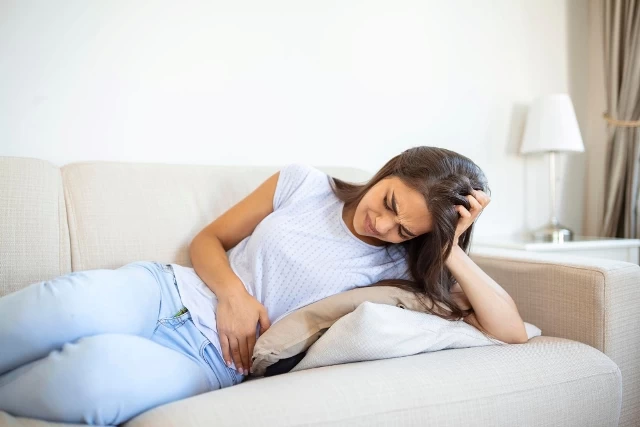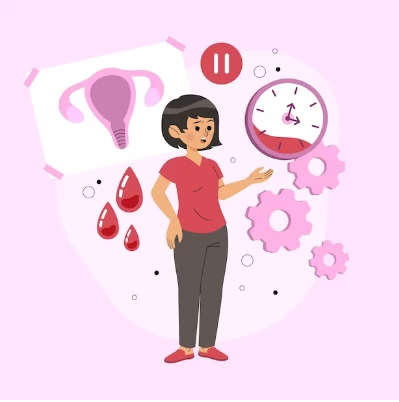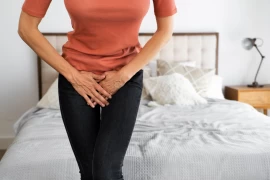
Menstrual Pain
- Menstrual Pain
- What is Menstrual Pain?
- What Causes Menstrual Pain?
- What Helps with Menstrual Pain?
- Does Menstrual Pain Affect Fertility?
What is Menstrual Pain?
Menstrual pain, also known as dysmenorrhea, is a condition characterized by severe and frequent cramps during menstrual periods. Many women experience menstrual pain during specific times. Mild cramps are considered normal during menstruation, but some women may struggle with severe menstrual pain.
Menstrual pain is generally not a sign of a serious health issue. Lifestyle changes can be made to alleviate these pains.
What Causes Menstrual Pain?
During the menstrual cycle, the uterine wall contracts strongly. The purpose of these contractions is to create the necessary pressure for the expulsion of blood from the uterus. As the uterine wall contracts, the blood vessels constrict as well. During this process, blood flow and consequently oxygen flow are temporarily cut off. This deprivation of oxygen releases certain chemicals in the uterine tissues that trigger menstrual pain. These released chemicals stimulate the production of other chemicals called prostaglandins. Prostaglandins cause increased uterine contractions and intensify the severity of pain.
Menstrual pain is generally considered a normal part of the menstrual process. However, severe menstrual pain can sometimes be caused by an underlying medical condition. Such pain may indicate the presence of conditions like endometriosis, which is the formation of cysts in the uterus. Additionally, factors such as fibroids, uterine tumors, cervical stenosis, excessive weight, inflammation of the uterus and fallopian tubes, or ovarian inflammation can lead to severe menstrual pain.
Menstrual pain not caused by any disease or problem typically diminishes as women age. During this time, natural and effective methods can be applied to alleviate the pain.

What Helps with Menstrual Pain?
To alleviate the pain, various pain-relieving medications (such as ibuprofen and aspirin) can be used. However, before resorting to medication, several methods can be tried. Here are some natural suggestions that may help relieve menstrual pain:
- Heat therapy: As a practical and effective method, heat therapy can be tried to cope with menstrual cramps. You can apply a hot water bottle or a heated towel (you can heat the towel with an iron) to your abdomen and lower back. This application can significantly help alleviate menstrual pain.
- Hot shower: Taking a hot shower is also an effective method to alleviate pain and cramps.
- Herbal teas: Herbal teas like chamomile and ginger have soothing properties that can help relieve menstrual pain. Chamomile tea is known for its stress-relieving and muscle-relaxing properties. Ginger tea has pain-relieving, menstrual-regulating, and anti-inflammatory effects.
- Dill: Dill is a unique herb that can help alleviate menstrual cramps and make the entire menstrual period less stressful. Dill has the ability to target pain and inflammation in the body, including menstrual pain.
- Magnesium-rich foods: Magnesium-rich foods are beneficial for everyone, but they are especially recommended for women experiencing severe menstrual pain. Magnesium is a natural mineral that helps regulate nerve and muscle function and possesses pain-relieving properties. Foods rich in magnesium include spinach, fresh beans, black beans, almonds, quinoa, asparagus, avocado, and mackerel.
- Exercise: Physical activity, especially relaxing exercises like yoga and pilates, can help alleviate menstrual cramps and pain. Swimming and light-paced walking are also activities worth trying.
- Avoidance of smoking and alcohol: Studies show that both smoking and alcoholic beverages can worsen menstrual pain. Therefore, it is important to avoid consuming these substances during the menstrual period.
- Massage: Massaging with lavender oil or peppermint oil can be an effective method to alleviate menstrual pain.
Does Menstrual Pain Affect Fertility?
Menstrual pain is typically a normal part of the menstrual cycle and does not usually affect fertility. However, it is important to investigate the underlying cause of the pain. If these pains are caused by a medical condition, they can potentially have a negative impact on fertility. It is important to consult with a gynecologist if you experience any of the following:
- Severe pain that interferes with daily activities
- A significant increase in bleeding
- Unusual intensification of cramps and pain
If the duration of the menstrual period is longer than usual, it indicates the need for careful monitoring to identify any potential serious problems. Therefore, close monitoring of these symptoms is highly important."





